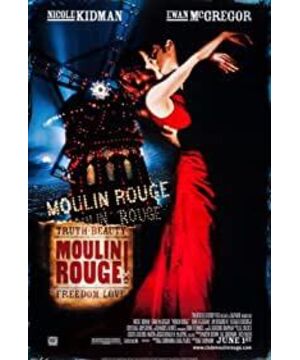No matter what the reason, I was too lazy to write a review of this film (the reason is explained above, there is nothing to say). But when I looked back, I found that the first time I watched it, I had overlooked a role in the play that was worth writing but was botched by the director. Suddenly, inspiration came.
This role does not appear directly in the play, only to hear the male protagonist call him "chocolate" again. He is estimated to be a humble ordinary worker at the Moulin Rouge, who is of a security level visually. He is a black man, and there are few pitiful scenes in the play. I looked back and checked it roughly. There were probably three main
points : First: 21 minutes and 57 seconds or so.
This is the first time the black man played. Satine inexplicably changed from a sexy showgirl to Lin Daiyu suffering from tuberculosis, and fell from mid-air. Then we can see a literal sister Lin falling from the sky, and Satine fell directly into the arms of the black man, and he steadily caught her with his strong arms. Then Sidler used his eyes to suggest that the nervous and surprised black man hugged Satine backstage (presumably he never dreamed that he would one day hold the goddess of the Moulin Rouge in his arms). Afterwards, the black man carefully took Satine to the backstage to rest under the eyes of the public.
At 22 minutes and 42 seconds, the black man hugged Satine onto a couch in the backstage. Then the camera gave a close-up. He gently held Satine's left cheek with his big hand, and gently put her head on the pillow.
I don’t know if other people who have watched this movie have any feelings about this scene. When I watched it for the second time, I really felt that the black man's series of actions really hinted that we actually have a deep love for Satine in his heart. If you feel that this is not obvious enough, you can look at the second place where he played again
: about the first hour, 25 minutes, and 25 seconds.
When the Duke was about to extend his claws to Satine, the black man finally appeared again (Tucao, I really don't know how he could enter the Duke's room). Facing the beastly Duke, he struck a punch and knocked the handsome and rich Duke directly to the ground. Next, the camera gave a close-up of the black man's face (note his frowning brow and concerned eyes, and the sweat on his forehead). Facing the shocked Satine, he silently averted his gaze and looked away.
At about the 51st second, the door of the anxious but helpless little writer's room was suddenly knocked open, and Satine rushed in, and then naturally hugged tightly with the little writer who had already had no master. Immediately, the camera shot to the black man with a complicated expression at the door, but it was only given for less than a second, and it was fleeting.
About 59 seconds, the three people formed a classic distance relationship. In the distance, Bai Fumei and Gao Qiongshuai complained to each other. In the distance, the back of the black brother, who was not even a spare tire, looked vague and confused.
At 26 minutes and 33 seconds, when the two talked about the elopement, the black brother's figure was directly sandwiched between their heads.
For 55 seconds, the heroine said "We have each other" affectionately to the hero, but the camera gave the black man the still confused eyes and helpless facial expressions. This time, there was a little sadness.
Then the little writer asked the black man to help Satine pack up and prepare to elope. The shooting here is quite interesting. When the writer had just finished speaking, the black man still had a reluctant expression and squinted his eyes. Then the camera was shown to Satine, who had already burst into laughter and beamed her brows. It is estimated that seeing that Satine is so happy in his heart, the black man then said in a firm and calm voice "I understand". After
seeing this, everyone can actually see that the black man is sincere and deep towards Satine. The love is over. I thought that the original love triangle relationship would be more turbulent because of him, making the plot more tortuous and vivid, but I never expected the director to use the lens language to finely portray the true feelings of the black man, and then it was like Suddenly forgot the same thing, and didn't mention a word. Even in the period before Sha Ting's death, the black man could only mix up with a showy scene.
Third place: About the first hour, 56 minutes and 43 seconds,
Satine was lying in the arms of the writer and was about to die. The writer was already crying. At this moment in the camera, the black man wearing a slightly funny Indian costume slowly took off his hat, and his makeup on his face could not conceal the sadness on his face. This time the shot is still only about two seconds, still fleeting.
Too lazy to complain about the director somehow inexplicably come up with a strange trick of tearing the role and then ignore it. Now enter the little sensational stage.
This black man reminds me of Quasimodo in "Notre Dame de Paris." When Esmeralda was convicted of being a witch and was about to be fired, it was Quasimodo who stood up bravely, rescued Esmeralda from the stake, and hid behind her in Paris. Notre Dame. This is similar to the black man holding Satine to the backstage. Later in Notre Dame, Quasimodo took care of Esmeralda every night and every day. When the evil priest came to insult Esmeralda, he also stood up and beat the priest (with the black man) The difference is that Quasimodo was raised and raised by a priest, and he has always held incomparable admiration and gratitude for him, which is even more commendable). They all feel inferior and shameful in front of the heroine, and they can't even speak, and the heroine means to them that they are out of reach. But they also always have a deep love for the heroine that they dare not express, and they have been paying silently behind their backs. In their hearts, it really is How wonderful life is, now you are in the world.
And what about the heroine to them? Esmeralda has nothing but gratitude and trust for Quasimodo to be rescued. She always remembers the handsome but handsome Captain Philbis who is actually playing with her. Satine is not even a little grateful to the black man (not to talk about the director). What the heroine thinks in her heart is a writer who thinks about "All you need is love" all day long, even if she thinks of something else. I thought of the Duke who could give her Diamonds. She never thought of the black dude from beginning to end.
What's more sad is that Quasimodo is the hero of the novel anyway, and he won tears and sympathy from all readers. Where is our black buddy? Haha, I played three times and didn't pay anything in return. All the tears in front of the screen have long been left to our innocent little cute writers.
View more about Moulin Rouge! reviews











